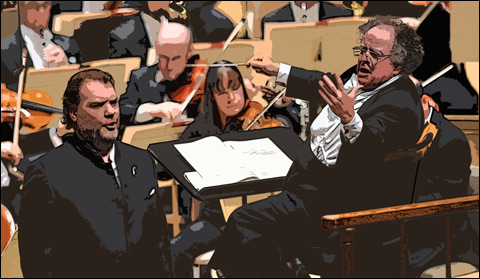
MASTERY Levine’s Wagner program (with bass-baritone Bryn Terfel) was serious and ambitious, yet extremely enjoyable — and short. |
Boston and New York have at least one thing in common. Both have missed James Levine, music director of two of the world's most renowned classical-music institutions: the Metropolitan Opera, which is celebrating Levine's 40th anniversary with the company, and the Boston Symphony Orchestra, where he's now beginning his sixth season. Out of commission since April, when he underwent a 10-1/2-hour back operation, he spent the summer not at Tanglewood but recuperating, even as some called for his BSO resignation. But he had a triumphant welcome in New York, where he opened the Met season with a complex, high-tech production of
Das Rheingold, the first opera in Wagner's four-part
Ring cycle. He and the orchestra got the best reviews. This Saturday (October 9), he'll lead the live HD telecast of
Das Rheingold at 1 pm, then jet to Boston, where at 8 pm he's contracted to conduct a BSO subscription concert of Mahler's huge Symphony No. 2 (
Resurrection) at Symphony Hall.
A couple of days before the gala-opening-night Wagner program, I spoke with BSO managing director Mark Volpe, who — aside from Levine himself — has probably had the hardest time dealing with the maestro's ailments. Were there contingency plans in case Levine had to cancel again? "We surveyed all the artist managements and talked to a few conductors directly. We know who isn't working on the weeks Jim is scheduled." Volpe was pretty certain the programming could be maintained. "Of course, as Jim himself has articulated, until he actually conducts the real schedule, no one can predict whether he can sustain his recovery." Volpe was impressed, however, with how thoroughly Levine "got into the convalescence." At the Met opening, he said, "Jimmy from the waist up was amazing."
He admitted that the BSO was not happy about Saturday's double dipping. "He found out in February, and we expressed our concern. Yet I can't stop him. He doesn't want to concede anything. He's optimistic to a fault." Volpe was more concerned about the complicated March schedule that takes the BSO to Carnegie Hall, Newark, and Washington, DC, with Mahler's Ninth Symphony, a Harrison Birtwistle premiere, and guest artists Christian Tetzlaff and Maurizio Pollini. He's also concerned about lost planning time for future seasons (which includes next summer). On the other hand, given the present roster of players, and Levine's capacity to "release the orchestra," Volpe's convinced the BSO is in as good a shape as he's heard it in his 14 years here. And there's also Boston. "There are cities where Western orchestral music has been somewhat marginalized. It's great to be in a city where music still matters!"
Levine's approach to the podium at the BSO opening was a little alarming. His walk was agonizingly careful. (Later, he told the gala-dinner patrons that though the surgery has in fact affected his ability to walk, he fortunately doesn't have to conduct with his feet. And that for the first time in years he was entirely free of pain.) His standing-O greeting preceded the most elegantly planned and exciting BSO opening night in memory, a concert no one but Levine could have put together and executed with such mastery: serious and ambitious, yet extremely enjoyable — and short. Levine gave us what he's best known for — opera — in a program devoted to Wagner, whose music Boston doesn't get nearly enough of.